Kabul by saib e tabrizi – Kabul by Saib e Tabriz is a literary masterpiece that transcends time, capturing the essence of a city through the lens of poetry. Saib e Tabriz’s verses paint a vivid tapestry of Kabul, weaving together its historical significance, cultural heritage, and symbolic meanings.
From the bustling streets to the serene gardens, Saib e Tabriz’s poetry immerses readers in the vibrant atmosphere of Kabul, exploring its political and economic importance, as well as its influence on the poet’s own creative style.
Kabul in the Poetry of Saib e Tabriz
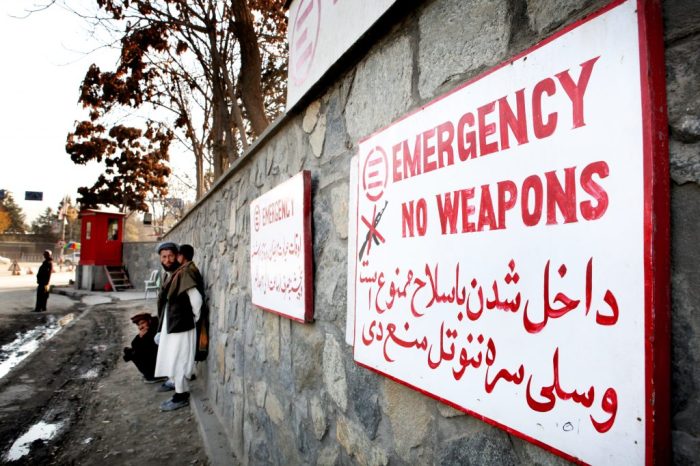
Saib e Tabriz, a renowned Persian poet of the 17th century, held a deep affection for Kabul, a city that significantly influenced his literary creations. Throughout his poetic repertoire, Kabul emerges as a recurring theme, imbued with symbolic and emotional resonance.
Kabul as a Symbol of Beauty and Grace
In Saib’s poetry, Kabul is often depicted as a paragon of beauty and elegance. He extols its verdant landscapes, sparkling rivers, and captivating atmosphere, evoking a sense of tranquility and allure. One of his most famous poems dedicated to Kabul begins with the following lines:
Oh, Kabul, city of charm and delight,
Your beauty captivates the hearts of all who behold you.
Kabul as a Center of Culture and Learning
Saib also recognized Kabul as a vibrant hub of culture and scholarship. He praises its libraries, mosques, and intellectual gatherings, where scholars and poets exchanged ideas and knowledge. In one of his poems, he writes:
Kabul, the cradle of learning and wisdom,
Your scholars illuminate the path of knowledge for all.
Kabul as a Symbol of Loss and Longing
However, Saib’s portrayal of Kabul is not always idyllic. He also expresses a sense of loss and longing for the city, particularly during his exile from its borders. In a poignant poem, he laments:
Oh, Kabul, my beloved city,
I yearn for your streets and the sound of your laughter.
Kabul by Saib e Tabriz is a classic Persian poem that captures the beauty and spirit of the city. If you’re interested in learning more about Persian literature, I recommend checking out unit 6 session 1 letrs . This online resource provides a comprehensive overview of Persian literature, including its history, major works, and literary devices.
Returning to Kabul by Saib e Tabriz, the poem’s vivid imagery and evocative language create a lasting impression on the reader.
Historical Context of Kabul in Saib e Tabriz’s Time: Kabul By Saib E Tabrizi
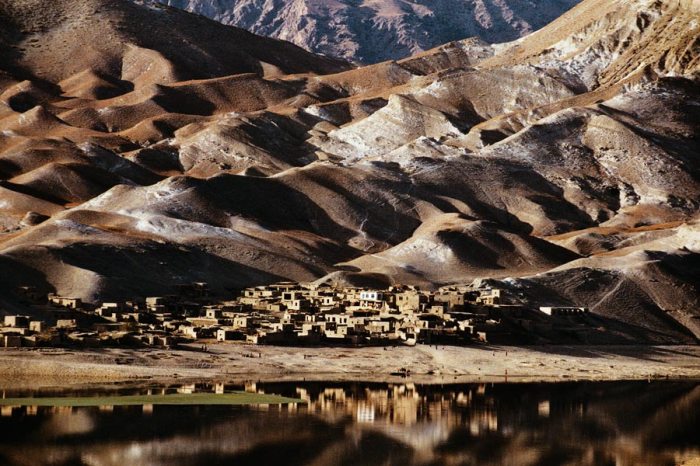
Kabul, a historic city at the crossroads of Central and South Asia, held significant importance during Saib e Tabriz’s lifetime. Its strategic location on the Silk Road made it a hub for trade, commerce, and cultural exchange.
Politically, Kabul was the capital of the Mughal Empire’s Kabul Subah, a province that included present-day Afghanistan and parts of Pakistan. The Mughal presence brought economic prosperity to the city, fostering trade and artistic patronage.
Political and Economic Factors
- Capital of Mughal Empire’s Kabul Subah, enhancing its political significance.
- Strategic location on the Silk Road, promoting trade and economic growth.
- Mughal patronage supported art and culture, contributing to Kabul’s intellectual and artistic vibrancy.
Cultural Significance
Kabul was also a center of Islamic learning and scholarship. The city boasted numerous mosques, madrasas, and libraries, attracting scholars and students from across the region. Saib e Tabriz’s poetry reflects the city’s rich cultural heritage and its status as a hub of knowledge and enlightenment.
Kabul as a Symbol in Saib e Tabriz’s Poetry
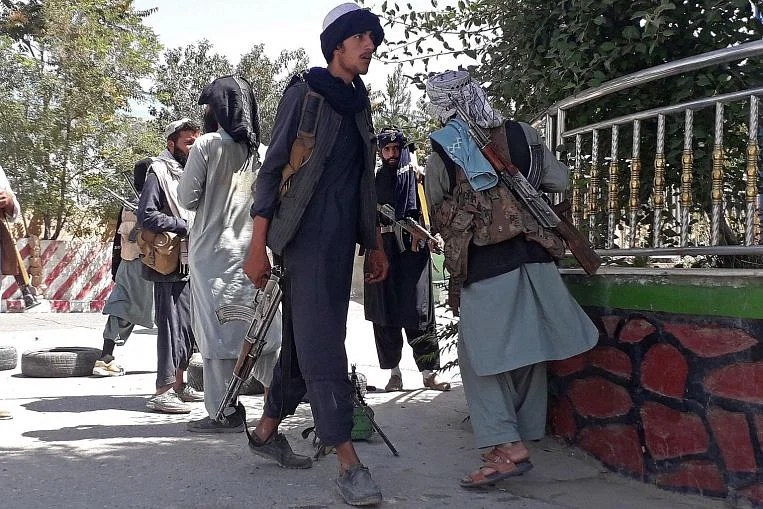
Saib e Tabriz’s poetry often uses Kabul as a symbol, evoking various meanings and emotions. This analysis explores the symbolic significance of Kabul in his work.
Kabul as a Place of Beauty and Desire
Saib e Tabriz frequently depicts Kabul as a city of extraordinary beauty, a paradise on earth. He describes its gardens, rivers, and palaces in glowing terms, creating a sense of longing and desire in the reader.
For example, in one poem, he writes:
Oh, Kabul, your beauty is a thousand times sweeter than the garden of paradise,
Your streams are purer than the water of life, and your gardens are more verdant than the meadows of heaven.
Kabul as a Symbol of Political and Cultural Center
Kabul also symbolizes the political and cultural center of the Mughal Empire during Saib e Tabriz’s time. He celebrates the city as a hub of learning, art, and commerce, where scholars, poets, and merchants from all over the world gathered.
In one of his qasidas, he praises the city’s ruler, Shah Jahan, for his patronage of the arts:
Oh, Shah Jahan, under your reign, Kabul has become a beacon of knowledge and culture,
A city where poets sing your praises and artists create masterpieces that will endure for centuries.
Kabul as a Metaphor for the Human Soul
Saib e Tabriz also uses Kabul as a metaphor for the human soul. He sees the city’s beauty and complexity as a reflection of the inner world of the individual.
In one of his ghazals, he writes:
Oh, my heart, you are like Kabul, a city of both beauty and pain,
Your gardens are filled with flowers, but your streets are also haunted by sorrow.
Influence of Kabul on Saib e Tabriz’s Poetic Style
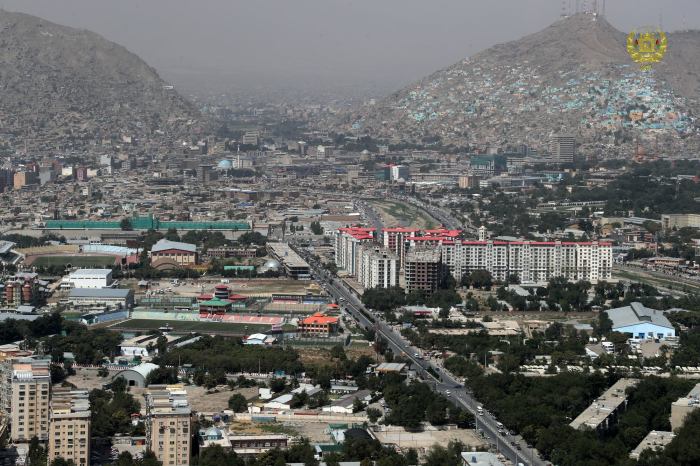
Kabul’s natural beauty and rich cultural heritage deeply influenced Saib e Tabriz’s poetic style. The city’s stunning mountains, lush gardens, and vibrant streets provided him with a wealth of imagery and inspiration.
Sights and Sounds of Kabul
The sights and sounds of Kabul permeated Saib’s poetry. He captured the city’s bustling bazaars, the call to prayer echoing through the streets, and the vibrant colors of its people and landscapes.
- In “Ode to Kabul,” he describes the city as “a garden of delights, where every flower blooms in beauty.”
- His poem “The Kabul River” celebrates the river’s “crystal waters” and its role as a source of life for the city.
Kabul as a Cultural Hub
Kabul’s position as a cultural hub exposed Saib to a wide range of influences. The city was home to scholars, artists, and poets from across the region. Saib’s interactions with these individuals shaped his poetic vocabulary and themes.
- He incorporated Persian, Arabic, and Indian elements into his poetry, creating a unique and cosmopolitan style.
- His poems often explore themes of love, loss, and the search for spiritual enlightenment.
Influence on Imagery and Language
Kabul’s influence on Saib’s poetic style is evident in his use of imagery and language. His poems are filled with vivid descriptions of the city’s natural beauty and its cultural life.
- He uses metaphors and similes to compare the city to a garden, a paradise, and a beloved.
- His language is often ornate and elaborate, reflecting the rich literary tradition of Kabul.
Kabul and the Literary Tradition of Saib e Tabriz
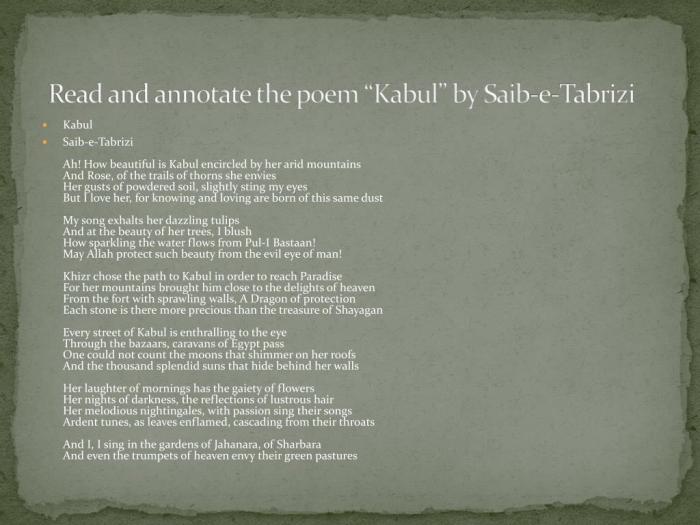
Saib e Tabriz was not the only poet to write about Kabul. The city has been a source of inspiration for poets throughout history, including Rumi, Khushal Khan Khattak, and Ghani Khan. Each of these poets has brought their own unique perspective to Kabul, reflecting the city’s rich and diverse history.
Rumi, for example, wrote about Kabul as a place of beauty and wonder. In his poem “The City of Kabul,” he describes the city’s gardens, rivers, and mountains, and praises its people for their hospitality and kindness. Khushal Khan Khattak, on the other hand, wrote about Kabul as a place of struggle and resistance.
In his poem “The Battle of Kabul,” he describes the city’s resistance to foreign invaders, and celebrates the bravery of its people.
Saib e Tabriz’s Unique Perspective, Kabul by saib e tabrizi
Saib e Tabriz’s portrayal of Kabul is unique in several ways. First, he focuses on the city’s religious significance. In his poem “The Shrine of Ali,” he describes the city as a place of pilgrimage, and praises the shrine of Ali ibn Abi Talib, the fourth caliph of Islam.
Second, Saib e Tabriz emphasizes the city’s role as a center of learning. In his poem “The University of Kabul,” he describes the city’s libraries and schools, and praises its scholars for their knowledge and wisdom.
Key Questions Answered
What is the significance of Kabul in Saib e Tabriz’s poetry?
Kabul holds a central place in Saib e Tabriz’s work, serving as a symbol of historical, cultural, and personal significance.
How does Saib e Tabriz use Kabul as a metaphor?
Saib e Tabriz employs Kabul as a metaphor for beauty, transience, and the enduring spirit of humanity.
What is the influence of Kabul’s natural beauty on Saib e Tabriz’s poetic style?
The sights, sounds, and experiences of Kabul inspire Saib e Tabriz’s vivid imagery, lyrical language, and evocative themes.
